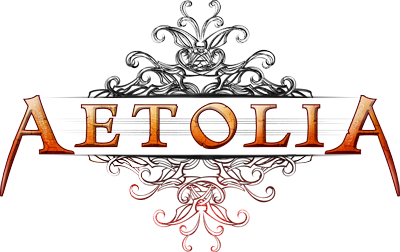Aetolian Game News
WAR
Written by: Varian the Celestine
Date: Tuesday, January 7th, 2003
Addressed to: Everyone
Today, I bring you war. For good or ill, conflict is and has always been
a source of strength and prosperity. Without conflict there is,
ultimately, only stagnation and decay. May war propel you and those
close to you unto greatness.
What follows is an overview of the changes that have been made to
Aetolia, comprising what I affectionately think of as the 'war system.'
Broadly, the war system allows organizations (just cities for now -
clans will follow soon) to engage in violent conflicts with one another
and makes it possible to win those conflicts (and conversely, to lose).
Previously, individuals or organizations would "declare war" on other
individuals or organizations and inevitably a pointless, extended fight
would ensue with no apparent advantage to either side ever emerging and
both sides inevitably getting frustrated. No more. As of today, if you
declare war on someone, you will be able to march to their front door
and literally conquer and pillage them... if you're mightier. If you're
not, then it just might be you who gets conquered and pillaged.
Warfare is, in large part, driven by economics. Soldiers do not fight
for free, swords and shields are not created out of thin air, and
territory does not remain claimed without maintenance. An organization's
military might is a function of its economic strength. Each location
captured by an organization will periodically earn a small amount of
some commodity (based on that location's environment type) into its
commodity stores. The Minister of Trade (who now finally has a job to do
- see HELP TRADE) is responsible for managing commodity stores and
making surpluses available for purchase by the populace. Note also that
players may now sell commodities to city commodity shops at prices set
by the Minister of Trade.
Diplomacy is as much a tool of warfare as are lances and arrows.
Organizations may form binding treaties with one another to strengthen
their positions or weaken those of their enemies. HELP DIPLOMACY has
more information about the role and use of treaties.
Of course, the most literal tools of war are people. Warfare-capable
organizations may induct NPCs, known as conscripts, into military
service. There are two types of conscript: guards and soldiers. Guards,
employed by the Ministry of Security, can be deployed within the
boundaries of the organization's home territory and serve the function
of protecting the populace from enemies (see HELP SECURITY). Note also
that the god-like city archers and city telepaths are no more. It is up
to the Ministry of Security to deploy guards in such ways as to catch
unwanted intruders. See HELP GUARDS for more about guards. Soldiers,
employed by the Ministry of War, usually come in divisions of troops.
Troop divisions can be marched forward into battle and used to capture
territory. Divisions can be commanded by members of the War Ministry or
by ranking members of the militia. See HELP WAR for more information
about soldiers and capturing territory.
An organization's militia is the force of volunteer (non-conscripted)
citizens who choose to fight for the organization's greater glory.
Perhaps the most important things to note about militia members are that
they do not enjoy divine grace and that the administration will not
interfere with any fighting between members of enemy militias (meaning
militias of organizations who are formally at war). So think carefully
before joining the militia! There will be a way to leave the militia
voluntarily, but you will not be able to re-join for a long time if you
do. See HELP MILITIA for specifics about militias.
There are two ways to conquer an enemy organization: If they surrender
(via treaty) or if you can capture 60% of their home territory plus
their council room. Once you have conquered the enemy, your city leader
may appoint someone to oversee your hostile occupation of the city. The
Minister of Occupation will have control over most of the conquered
organization's finances, shops, etc. One thing the Occupation will not
be able to touch is the conquered organization's military and military
funding. Rebellion is very much a possibility! A help file on the
subject of hostile occupation is forthcoming.
---
The other immortals and I have tested these changes as much as possible,
but as complex and comprehensive as they are, there will undoubtedly be
bugs and other problems. If you find what you believe to be a bug,
please file a bug report as described in HELP BUGS. Exploiting such a
bug for personal gain will not be looked upon favorably. If you're not
sure whether what you're seeing is a bug or intentional, feel free to
ask an administrator or celani. One thing you may notice is that city
commands no longer work exactly like they used to and that you have to
be standing inside the city, where you didn't before. This is because
it's now possible to have authority in more than one city if your city
has conquered another and you are the Occupation Minister.
Suggestions are also, as always, welcome, but please keep in mind that
this is only the first phase of what I have planned. Subsequent
additions should flesh out this system even more and make it even richer
and more interesting. With that in mind, if you believe you have an
important suggestion to make, take the time to discuss it with friends
and be sure that it makes sense in the grand scheme. Then, feel free to
msg or e-mail (varian@aetolia.com) Me with your ideas. I can't promise a
response, but I do read every message sent to Me and will give each
suggestion due consideration.
-Varian the Celestine
Penned by my hand on the 3rd of Lanosian, in the year 89 MA.
